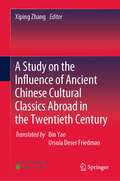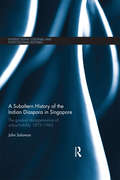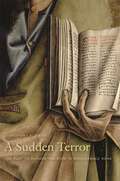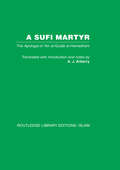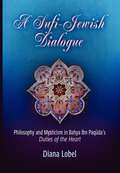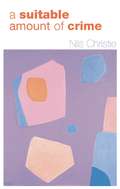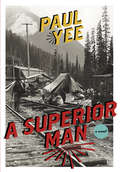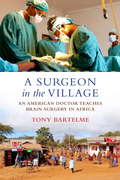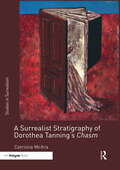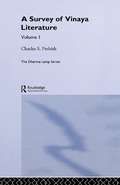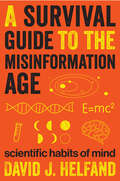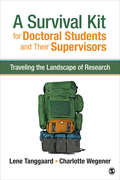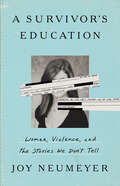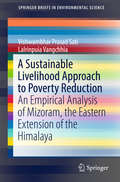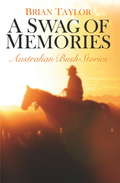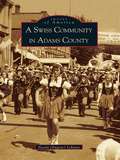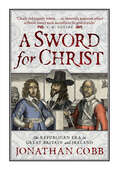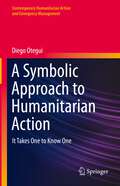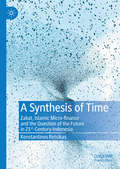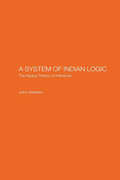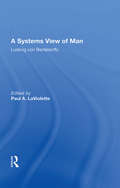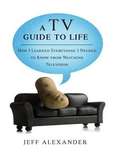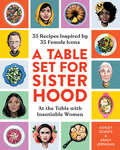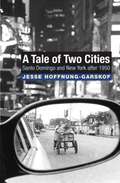- Table View
- List View
A Study on the Influence of Ancient Chinese Cultural Classics Abroad in the Twentieth Century
by Xiping ZhangThis book presents an extensive literary survey of the influence of ancient Chinese cultural classics around the globe, highlighting a mammoth research project involving over forty countries or regions and more than twenty languages. As the book reveals, ancient Chinese culture was introduced to East Asian countries or regions very early on; furthermore, after the late Ming Dynasty, Chinese “knowhow” and ideas increasingly made inroads into the West. In particular, the translation of and research on Chinese classics around the world have enabled Chinese culture to take root and blossom on an unprecedented scale. In addition to offering a valuable resource for readers interested in culture, the social sciences, and philosophy, the book blazes new trails for the study of ancient Chinese culture.
A Subaltern History of the Indian Diaspora in Singapore: The Gradual Disappearance of Untouchability 1872-1965 (Intersections: Colonial and Postcolonial Histories)
by John SolomonUntouchable migrants made up a substantial proportion of Indian labour migration into Singapore in the nineteenth and twentieth centuries. During this period, they were subject to forms of caste prejudice and discrimination that powerfully reinforced their identities as untouchables overseas. Today, however, untouchability has disappeared from the public sphere and has been replaced by other notions of identity, leaving unanswered questions as to how and when this occurred. The untouchable migrant is also largely absent from popular narratives of the past. This book takes the "disappearance" as a starting point to examine a history of untouchable migration amongst Indians who arrived in Singapore from its modern founding as a British colony in the early nineteenth century through to its independence in 1965. Using oral history records, archival sources, colonial ethnography, newspapers and interviews, this book examines the lives of untouchable migrants through their everyday experience in an overseas multi-ethnic environment. It examines how these migrants who in many ways occupied the bottom rungs of their communities and colonial society, framed transnational issues of identity and social justice in relation to their experiences within the broader Indian diaspora in Singapore. The book trances the manner in which untouchable identities evolved and then receded in response to the dramatic social changes brought about by colonialism, war and post-colonial nationhood. By focusing on a subaltern group from the past, this study provides an alternative history of Indian migration to Singapore and a different perspective on the cultural conversations that have taken place between India and Singapore for much of the island's modern history.
A Sudden Terror: The Plot to Murder the Pope in Renaissance Rome
by Anthony F. D'EliaIn 1468, on the final night of Carnival in Rome, Pope Paul II sat enthroned above the boisterous crowd, when a scuffle caught his eye. His guards had intercepted a mysterious stranger trying urgently to convey a warning conspirators were lying in wait to slay the pontiff. Twenty humanist intellectuals were quickly arrested, tortured on the rack, and imprisoned in separate cells in the damp dungeon of Castel Sant Angelo. Anthony D Elia offers a compelling, surprising story that reveals a Renaissance world that witnessed the rebirth of interest in the classics, a thriving homoerotic culture, the clash of Christian and pagan values, the contest between republicanism and a papal monarchy, and tensions separating Christian Europeans and Muslim Turks. Using newly discovered sources, he shows why the pope targeted the humanists, who were seen as dangerously pagan in their Epicurean morals and their Platonic beliefs about the soul and insurrectionist in their support of a more democratic Church. Their fascination with Sultan Mehmed II connected them to the Ottoman Turks, enemies of Christendom, and the love of the classical world tied them to recent rebellious attempts to replace papal rule with a republic harking back to the glorious days of Roman antiquity. From the cosmetic-wearing, parrot-loving pontiff to the Turkish sultan, savage in war but obsessed with Italian culture, D Elia brings to life a Renaissance world full of pageantry, mayhem, and conspiracy and offers a fresh interpretation of humanism as a dynamic communal movement.
A Sufi Martyr: The Apologia of 'Ain al-Qudat al-Hamadhani
by A.J. ArberryOriginally published in 1969. This volume was composed by an eminent Sufi mystic whilst in prison in Baghdad, awaiting execution, in a vain attempt to overthrow his sentence; he was put to death in AD 1311 at the age of 33. This apologia is a document of great poignancy, composed in most elegant Arabic and translated with the customary skill and elegance for which A J Arberry became so well-known.
A Sufi-Jewish Dialogue
by Diana LobelWritten in Judeo-Arabic in eleventh-century Muslim Spain but quickly translated into Hebrew, Bahya Ibn Paquda's Duties of the Heart is a profound guidebook of Jewish spirituality that has enjoyed tremendous popularity and influence to the present day. Readers who know the book primarily in its Hebrew version have likely lost sight of the work's original Arabic context and its immersion in Islamic mystical literature. In A Sufi-Jewish Dialogue, Diana Lobel explores the full extent to which Duties of the Heart marks the flowering of the "Jewish-Arab symbiosis," the interpenetration of Islamic and Jewish civilizations.Lobel reveals Bahya as a maverick who integrates abstract negative theology, devotion to the inner life, and an intimate relationship with a personal God. Bahya emerges from her analysis as a figure so steeped in Islamic traditions that an Arabic reader could easily think he was a Muslim, yet the traditional Jewish seeker has always looked to him as a fountainhead of Jewish devotion. Indeed, Bahya represents a genuine bridge between religious cultures. He brings together, as well, a rationalist, philosophical approach and a strain of Sufi mysticism, paving the way for the integration of philosophy and spirituality in the thought of Moses Maimonides.A Sufi-Jewish Dialogue is the first scholarly book in English about a tremendously influential work of medieval Jewish thought and will be of interest to readers working in comparative literature, philosophy, and religious studies, particularly as reflected in the interplay of the civilizations of the Middle East. Readers will discover an extraordinary time when Jewish, Christian, and Islamic thinkers participated in a common spiritual quest, across traditions and cultural boundaries.
A Suitable Amount of Crime
by Nils ChristieCrime and punishment are social and cultural manifestations; they are closely bound up with people's perceptions of morality, norms and values. In this book, Nils Christie argues that crime is a fluid and shallow concept - acts that could be construed as criminal are unlimited and crime is therefore in endless supply. It should not be forgotten that there are alternatives, both in the definition of crime, and in responses to it. A Suitable Amount of Crime looks at the great variations between countries over what are considered 'unwanted acts', how many are constructed as criminal and how many are punished. It explains the differences between eastern and western Europe, between the USA and the rest of the world. The author laments the size of prison populations in countries with large penal sectors, and asks whether the international community has a moral obligation to 'shame' states that are punitive in the extreme.The book is written in an engaging and easily accessible style that will appeal to anyone interested in understanding contemporary problems of crime and punishment.
A Superior Man
by Paul YeeFor more than thirty years, Paul Yee has written about his Chinese-Canadian heritage in award-winning books for young readers as well as adult non-fiction. Here, in his first work of fiction for adults, he takes us on a harrowing journey into a milestone event of Canadian history: the use of Chinese coolies to help build the Canadian Pacific Railway in British Columbia in hazardous conditions.After the CPR is built in 1885, Yang Hok, a former coolie, treks along the railway to return his half-Chinese/half-Native son to the boy's mother where he confronts the conflicts arising from road-building among the Chinese and Native peoples. Hok's guide on the often perilous trip, Sam Bing Lew, also of mixed Chinese-Native blood, urges Hok to take his son to China, while Hok has dreams of finding fortune in America. The two men agree on little, as many issues fester between Chinese and Natives at a time when both races were disdained as inferior by whites ("redbeards").This far-reaching novel crackles with the brutal, visceral energy of the time-a period marked by contraband, illegal gambling, disfigurement, and death. It also depicts the bawdy world of Chinese "bachelors," whose families remained in China while they worked in Canada, and who enjoyed more freedom to live their lives without restraint. Yang Hok is not an easy man to like; but through the blood and sweat of his experience, he aspires to become the "superior man" he knows he should be. Boldly frank and steeped in history, A Superior Man paints a vivid portrait of the experience of the Chinese in North America in the 19th century.Paul Yee's twenty-seven books for young people include the Governor General's Award-winning Ghost Train. This is his first novel for adults.
A Surgeon in the Village: An American Doctor Teaches Brain Surgery in Africa
by Tony BartelmeAn inspiring story of doctors who changed the health care of an African nationDr. Dilan Ellegala arrives in Tanzania, shocked to find the entire country has just three brain surgeons for its population of forty-two million. Haydom Lutheran Hospital lacks even the most basic surgical tools, not even a saw to open a patient’s skull. Here, people with head injuries or brain tumors heal on their own or die. When confronted with a villager suffering from a severe head trauma, Dilan buys a tree saw from a farmer, sterilizes it, and then uses it to save the man’s life.Yet Dilan realizes that there are far too many neurosurgery patients for one person to save, and of course he will soon be leaving Tanzania. He needs to teach someone his skills. He identifies a potential student in Emmanuel Mayegga, a stubborn assistant medical officer who grew up in a mud hut. Though Mayegga has no medical degree, Dilan sees that Mayegga has the dexterity, intelligence, and determination to do brain surgery. Over six months, he teaches Mayegga how to remove tumors and treat hydrocephalus. And then, perhaps more important, Dilan teaches Mayegga how to pass on his newfound skills. Mayegga teaches a second Tanzanian, who teaches a third. It’s a case of teach-a-man-to-fish meets brain surgery.As he guides these Tanzanians to do things they never thought possible, Dilan challenges the Western medical establishment to do more than send vacationing doctors on short-term medical missions. He discovers solutions that could transform health care for two billion people across the world.A Surgeon in the Village is the incredible and riveting account of one man’s push to “train-forward”—to change our approach to aid and medical training before more lives are needlessly lost. His story is a testament to the transformational power of teaching and the ever-present potential for change. As many as seventeen million people die every year because of a shortage of surgeons, more than die from AIDS, malaria, and tuberculosis combined. Dilan Ellegala and other visionaries are boldly proposing ways of saving lives.
A Surrealist Stratigraphy of Dorothea Tanning’s Chasm (Studies in Surrealism)
by Catriona McAraIn A Surrealist Stratigraphy of Dorothea Tanning’s Chasm, Catriona McAra offers the first critical study of the literary work of the celebrated American painter and sculptor Dorothea Tanning (1910–2012). McAra fills a major gap in the scholarship, repositioning Tanning’s writing at the centre of her entire creative oeuvre and focusing on a little-known short story "Abyss," a gothic-flavoured, desert adventure which Tanning worked on intermittently throughout her creative life, finally publishing it in 2004 as Chasm: A Weekend.McAra performs a major reassessment of the visual and literary principles upon which the surrealist movement was initially founded. Combining a groundbreaking methodological approach with reference to cultural theory and feminist aesthetics as well as Tanning’s unpublished journals and notes, McAra reveals Tanning as a key player in contemporary art practice as well as in the historical surrealist milieu.
A Survey of Vinaya Literature (Routledge Critical Studies in Buddhism #Vol. 1)
by Charles S. PrebishThe most important research tool for vinaya studies. Covers both primary and secondary sources in Sanskrit, Pali, Tibetan, and Chinese as well as modern sources in English, French, German and Japanese.
A Survival Guide to the Misinformation Age: Scientific Habits of Mind
by David J. HelfandLearning how to tell news from fake news from fake fake news: An &“important and timely&” book on protecting ourselves, and society, from the infodemic (Library Journal). We have billions of bytes of data at our fingertips. But how much of it is misinformation—or even disinformation? A lot of it is, and your search engine can&’t tell the difference. As a result, an avalanche of misinformation threatens to overwhelm the discourse we so desperately need to address complex social problems such as climate change, the food and water crises, biodiversity collapse, and emerging threats to public health. This book provides an inoculation against the misinformation epidemic by cultivating scientific habits of mind. Anyone can do it—indeed, everyone must do it if our species is to survive on this crowded and finite planet. This survival guide supplies an essential set of apps for the prefrontal cortex while making science both accessible and entertaining. It will dissolve your fear of numbers, demystify graphs, and elucidate the key concepts of probability, all while celebrating the precise use of language and logic. David Helfand, one of our nation&’s leading astronomers and science educators, has taught scientific habits of mind to generations in the classroom, where he continues to wage a provocative battle against sloppy thinking and the encroachment of misinformation. &“Provides a vital antidote to the ills of misinformation by teaching systematic and rigorous scientific reasoning.&” —The Times Literary Supplement
A Survival Kit for Doctoral Students and Their Supervisors: Traveling the Landscape of Research
by Charlotte Wegener Professor Lene TanggaardA Survival Kit for Doctoral Students and Their Supervisors offers a hands-on guide to both students and supervisors on the doctoral journey, helping make the process as enjoyable as it is productive. Drawing on research from peer learning groups, contributed narratives, and their own programs, authors Lene Tanggaard and Charlotte Wegener emphasize the value of the doctoral partnership and the ways in which shared knowledge can facilitate a rewarding journey for students and their advisors. Grounded in theoretical and empirical material, the book helps participants navigate the doctoral process with personal stories and examples from a variety of researchers. A discussion of common challenges and the inclusion of practical tips further enhance the book’s diverse range of helpful resources.
A Survival Kit for Doctoral Students and Their Supervisors: Traveling the Landscape of Research
by Charlotte Wegener Professor Lene TanggaardA Survival Kit for Doctoral Students and Their Supervisors offers a hands-on guide to both students and supervisors on the doctoral journey, helping make the process as enjoyable as it is productive. Drawing on research from peer learning groups, contributed narratives, and their own programs, authors Lene Tanggaard and Charlotte Wegener emphasize the value of the doctoral partnership and the ways in which shared knowledge can facilitate a rewarding journey for students and their advisors. Grounded in theoretical and empirical material, the book helps participants navigate the doctoral process with personal stories and examples from a variety of researchers. A discussion of common challenges and the inclusion of practical tips further enhance the book’s diverse range of helpful resources.
A Survivor's Education: Women, Violence, and the Stories We Don't Tell
by Joy NeumeyerA timely memoir about intimate abuse, campus politics, and the narratives we choose to believe In this poignant self-investigation, historian and journalist Joy Neumeyer explores how violence against women is portrayed, perceived, and adjudicated today. Interweaving the harrowing account of the abuse she experienced as a graduate student at Berkeley with those of others who faced violence on campus and beyond, Neumeyer offers a startling look at how the hotly-debated Title IX system has altered university politics and culture, and uncovers the willful misremembrance that enables misconduct on scales large and small. Deeply researched, daringly inquisitive, and resonant for our times, A Survivor's Education reveals the entanglement of storytelling, abuse, and power–and how we can balance narrative and evidence in our attempts to determine what &“really&” happened.
A Sustainable Livelihood Approach to Poverty Reduction: An Empirical Analysis of Mizoram, the Eastern Extension of the Himalaya (SpringerBriefs in Environmental Science)
by Vishwambhar Prasad Sati Lalrinpuia VangchhiaThis book presents a socio-economic and livelihood analysis of agriculturally-dependent communities of Mizoram, the eastern extension of the Himalaya, using the sustainable livelihood approach. Such an approach to poverty reduction is inevitable, particularly, in areas where livelihoods depend largely on biomass-based agriculture and livestock production. Mizoram possesses abundant natural resources - land, water and forest - but those resources are largely unused. The region suffers from chronic poverty and malnutrition, and climate change has further influenced livelihood patterns. This work studies all the aspects of natural potentials and livelihood status in Mizoram. It also discusses the major driving forces that influence livelihood patterns. Based on a detailed analysis of empirical data, several policy measures are suggested to cope with chronic poverty and malnutrition. The book is therefore highly useful for all stakeholders; students, researchers, academicians, policy makers and politicians involved in rural/community development.
A Swag of Memories: Australian Bush Stories
by Brian TaylorA quintessential Australian bushman, Brian Taylor has spent most of his life on the land. Working as a drover, a stockman, a fencer, a shearer and a saddler, he has gathered a swag of stories over the years as he travelled way out past the Barcoo, along the dusty plains and beside the dry creek beds under the endless southern sky. In A SWAG OF MEMORIES Brian Taylor shares with us these stories, of the people he has met, the places he has been and the moments, long-gone, that define the traditions of the Australian bush. Like those bush poets and storytellers of days past, Taylor brings to life the characters and the creatures of the bush: men like Dangerous Dan Smith, a hard, self-reliant man who had a gentler talent; Father Peter, a parish priest and occasional hero; Charlie Gibson, an Aboriginal stockman who knew the land better than anyone; and Banjo, the ever-alert dingo watchdog. These colourful and evocative bush tales delightfully capture a slight of Australian life that many of us will never get to see. Luckily, with this collection, you can sit back with a billy of tea and read all about it.
A Swiss Community in Adams County
by Naomi Eugene LehmanIn the mid-19th century, many Swiss families fled their homeland in order to avoid the rigid restrictions placed on religious and political beliefs. Many found solace in the little town of Berne, Indiana, and in the surrounding communities of Adams County. In 2002, Berne will celebrate 150 years of settlement and growth. In preparation, Naomi Lehman has compiled a unique visual history of these family-oriented communities, chronicling the history of the rich ancestral Swiss Emmenthaler culture that is still alive in the area today. Most of Adams County's early settlers hailed from Switzerland's capital of Bern, located in the Canton of Bern, and made the capital the namesake of their new home. The heavily forested and swampy land was cleared and tiled. Homes were constructed, churches flourished, and family businesses opened, some still existing today. Captured here in over 200 vintage images are the trials and triumphs of a classic Swiss community, including photographs of early farming families, industries and businesses, churches, and schools, blanketing not just Berne, but Geneva, Decatur, Linn Grove, and Monroe in Adams County, as well as Bluffton and Vera Cruz in neighboring Wells County.
A Sword for Christ: The Republican Era in Great Britain and Ireland
by Jonathan CobbThe fifteen-year period between 1645 and 1660 was one of the most dynamic in British history, during which the republican Commonwealth and Cromwellian Protectorate attempted to create a new type of ‘Godly’ state after the execution of Charles I. Drawing on the latest research and established sources, as well as the works and diaries of contemporaries such as John Evelyn, Lucy Hutchinson and Samuel Pepys, A Sword for Christ offers a new and stimulating perspective on these extraordinary years. Key personalities such as Sir Thomas Fairfax, the Marquis of Argyll, Charles II and, of course, Oliver Cromwell himself – one of the most contentious figures in history – are re-appraised and brought vividly to life. In addition to exploring the religious and political debates which shaped the era and the military culture which defined it, the book also considers how society was profoundly affected by the upheaval caused by the civil wars; the relations between what was essentially an English republic and its Irish and Scottish neighbours; and the ethos of the New Model Army and the navy.
A Symbolic Approach to Humanitarian Action: It Takes One to Know One (Contemporary Humanitarian Action and Emergency Management)
by Diego OteguiThis book aims to present an alternative view of humanitarian action. It adds to current conversations and dilemmas within the humanitarian sphere by departing from traditional views that consider humanitarian interventions as a concrete human activity aimed at providing relief to disaster victims. Much differently, it invokes the idea that humanitarian action is also a cognitive process. In this process, both humanitarians and disaster survivors alike, unknowingly, apply historically, societally, and culturally defined symbolic constructions to make sense of post-disaster information and to make decisions. In the specific case of humanitarian workers, these symbolic constructions influence how they understand their post-disaster reality, including how they relate to those they consider to be in pain or distress. This way of looking at humanitarian action builds upon a robust theoretical framework called Institutional Logics, which helps us identify and interpret how individuals make sense of their reality. So it brings the complex world of the individual into a discussion that generally considers the organization as the unit of analysis. Studying humanitarian action through this alternative lens makes it easy to see that objective and verifiable post-disaster information is a necessary but not a sufficient condition to design humanitarian interventions, let alone assess their value and benefits. A Symbolic Approach to Humanitarian Action: It Takes One to Know One aims to bridge the gap between research and practice in humanitarian action by translating academic knowledge into an accessible format that can be used by practitioners to improve their work on the ground.
A Synthesis of Time: Zakat, Islamic Micro-finance and the Question of the Future in 21st-Century Indonesia
by Konstantinos RetsikasThis book is an anthropological investigation into the different forms the economy assumes, and the different purposes it serves, when conceived from the perspective of Islamic micro-finance as a field of everyday practice. It is based on long-term ethnographic research in Java, Indonesia, with Islamic foundations active in managing zakat and other charitable funds, for purposes of poverty alleviation. The book explores the social foundations of contemporary Islamic practices that strive to encompass the economic within an expanded domain of divine worship and elucidates the effects such encompassment has on time, its fissure and synthesis. In order to elaborate on the question of time, the book looks beyond anthropology and Islamic studies, engaging attentively, critically and productively with the post-structuralist work of G. Deleuze, M. Foucault and J. Derrida, three of the most important figures of the temporal turn in contemporary philosophy.
A System of Indian Logic: The Nyana Theory of Inference
by John VattankyNyana is the most rational and logical of all the classical Indian philosophical systems. In the study of Nyana philosophy, Karikavali with its commentary Muktavali, both by Visvanatha Nyayapancanana, with the commentaries Dinakari and Ramarudri, have been of decisive significance for the last few centuries as advanced introductions to this subject. The present work concentrates on inference (anumana) in Karikavali, Muktavali and Dinakari, carefully divided into significant units according to the subject, and translates and interprets them. Its commentary makes use of the primary interpretation in Sanskrit contained especially in the Ramarudri and Subodhini. The book begins with the Sanskrit texts of Karikavali and Muktavali; followed by English translation of these texts. Next is given the Sanskrit text of Dinakari which comments on the first two texts, followed by its English translation. Lastly, the book contains a commentary on all the texts included.
A Systems View Of Man: Collected Essays
by Ludwig von BertalanffyWhat does it mean to be human? What distinguishes man from other animals? “Man’s creation of the universe of symbols,†replies Ludwig von Bertalanffy. “Man lives in a world not of things, but of symbols.†Dr. von Bertalanffy explores the historical development of symbolic language, examines the nature of human values, and shows how a current breakdown of symbolic universes contributes to the feeling of meaninglessness so prevalent in modern society. He notes that a major portion of mankind’s aggressive acts are not biologically induced but arise within symbolic frameworks.
A TV Guide to Life
by Jeff AlexanderRead Jeff Alexander's posts on the Penguin Blog. A couch potato's book of wisdom-- 100% commercial free! Some say that entire generations of Americans are being raised by the television...like that's a bad thing. Not so, says author Jeff Alexander, long-time television writer, advocate of education by television, and recapper for the popular website Television Without Pity. Here, he offers the ultimate in life lessons as seen on TV. Topics include: * Saved by the Bell: School on TV * Somebody Save Me: Super Powers and Magic Spells * Tell Me Why I Love You Like I Do: Relationships on TV * Making A Living: The Workplace * And more With a smart, snarky style, Alexander guides readers through important lessons gleaned from years of TV reviewing (now in convenient book form!), freeing up a whole new generation to learn other things, like how to cure cancer or solve world hunger...or anything more useful than watching TV (Author's note: Just joking... there is no such thing).
A Table Set for Sisterhood: 35 Recipes Inspired by 35 Female Icons
by Ashley Schütz Ashly JerniganEmpowering women, deliciously. There is something magical that happens when women come together over food. By sharing our stories and sharing a meal, we are sharing in celebrating women and empowering them. A Table Set for Sisterhood is a fully illustrated, wholly original cookbook that focuses on empowering women by celebrating specific icons who changed history. By introducing these women through the medium of food — a dish related to their work and what they fought for — A Table Set for Sisterhood fuses the arts of storytelling and cooking ... and invites women to share a seat at the table with their favourite feminist icons. The women featured include: Frida Kahlo, Malala Yousafzai, Marsha P. Johnson, Angela Davis, Hayley Wickenheiser, Oprah Winfrey, Amelia Earhart, Ruth Bader Ginsberg, Rupi Kaur, and so many more!
A Tale of Two Cities: Santo Domingo and New York After 1950
by Jesse Hoffnung-GarskofIn the second half of the twentieth century Dominicans became New York City's largest, and poorest, new immigrant group. They toiled in garment factories and small groceries, and as taxi drivers, janitors, hospital workers, and nannies. By 1990, one of every ten Dominicans lived in New York. A Tale of Two Cities tells the fascinating story of this emblematic migration from Latin America to the United States. Jesse Hoffnung-Garskof chronicles not only how New York itself was forever transformed by Dominican settlement but also how Dominicans' lives in New York profoundly affected life in the Dominican Republic.<P> A Tale of Two Cities is unique in offering a simultaneous, richly detailed social and cultural history of two cities bound intimately by migration. It explores how the history of burgeoning shantytowns in Santo Domingo--the capital of a rural country that had endured a century of intense U.S. intervention and was in the throes of a fitful modernization--evolved in an uneven dialogue with the culture and politics of New York's Dominican ethnic enclaves, and vice versa. In doing so it offers a new window on the lopsided history of U.S.-Latin American relations. What emerges is a unique fusion of Caribbean, Latin American, and U.S. history that very much reflects the complex global world we live in today.
